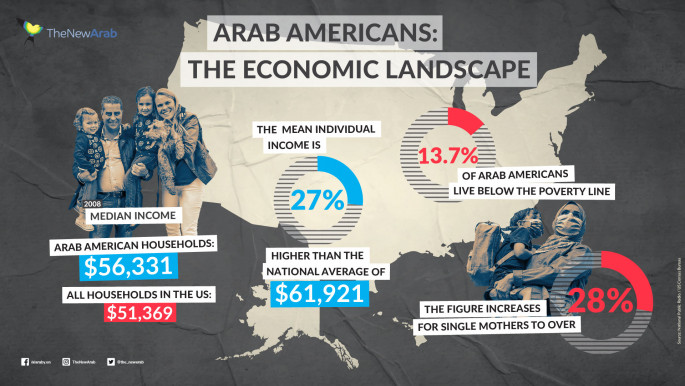
#Election2020: Arab Americans, it's time for a seat at the table
For Arab-Americans, assimilation used to mean being apolitical. Now, we are waking up to the fact our inclusion in politics is vital to combat our community's marginalisation, writes Diala Ghneim.
4 min read
A mural by artist Junker urges people to vote in California [Getty]
With less than 24 hours left for America to vote, I would be lying if I said I wasn't nervous about this election's outcome.
And as cliché as it sounds for me to write a piece redundantly echoing the "I vote for a better future" statement, I hope it is understood how these words carry immense value for Arab Americans.
I am a third culture kid. I was born in the US but have lived most of my life abroad. I returned to America in 2013 when the political climate was nowhere near our present reality.
As many immigrant communities, Arab Americans have generally been raised to be apolitical. In a post 9/11 world, the community found itself both invisible yet targeted at the same time: A perfect oxymoron.
We are considered invisible as there is an underrepresentation of us in American media. We are not part of American history textbooks or in school curriculums, and our culture is grouped with other regions to drop the political heaviness of the word "Arab". A "Greek" or "Mediterranean" affiliation is friendlier and much more acceptable to the masses.
Yet, at the same time, Arab Americans face discrimination based on their accents, ethnicities, physical appearances, religions and languages.
In an effort to become better assimilated in America, many Arab Americans chose to remain silent when it comes to political, social or domestic issues. Decades of US foreign policy in the Middle East has also inspired many Arab Americans to self-marginalise and avoid engagement. Given many were labelled "un-American", targeted with humiliating extra searches at the airport and subjected to racial slurs, those fears were warranted.
 |
We are not part of American history textbooks or in school curriculums, and our culture is grouped with other regions to drop the political heaviness of the word 'Arab' |  |
In an effort to become better assimilated in America, many Arab Americans chose to remain silent when it comes to political, social or domestic issues. Decades of US foreign policy in the Middle East has also inspired many Arab Americans to self-marginalise and avoid engagement. Given many were labelled "un-American", targeted with humiliating extra searches at the airport and subjected to racial slurs, those fears were warranted.
 |
|
| Click to enlarge |
But something is changing. It could be the natural evolution of circumstances, or the 2016 presidential shake-up or 2020's never-ending horror movie, but there has been a sudden shift of perspective among Arab Americans.
This year in particular was the push Arab Americans needed to get involved. Moving from isolation coupled with self-imposed marginalisation, Arab Americans are now vocal advocates of meaningful participation. We want to vote, talk and feature in these discussions.
We want to educate and debate and discuss. We want to stand in solidarity with other marginalised groups. We want to be consulted and most importantly, we want seats on the table.
The older generation, who are traditionally more reserved when it comes to voicing political opinions, are gradually offering their support and trust to the younger generation on leading this transition. And voting is one of the simplest actions needed to materialise such a vision.
The older generation, who are traditionally more reserved when it comes to voicing political opinions, are gradually offering their support and trust to the younger generation on leading this transition. And voting is one of the simplest actions needed to materialise such a vision.
 |
Arab Americans have the power to eventually become a consequential community and the younger generation holds the key |  |
A few weeks ago, I was speaking to an Arab American leader of my community in the Chicago area. We talked about this noticeable change between Arab American engagement in the 2016 elections versus 2020, and how four years can truly transform a community. She told me Arab Americans have the power to eventually become a consequential community and how the younger generation holds the key to our community's inclusivity in US politics.
So vote. Vote to have multiple seats at the table. Vote to take control of your own narratives. Vote for those who died from the global pandemic. Vote for racial justice. Vote for solving the $1.6 trillion student debt and vote for a better future.
Diala is a communications and advocacy professional specialising in bridging the gap between multilateral institutions and civil society organisations operating in crisis-affected countries.
Follow her on Twitter: @Diala_Ghneim
Diala is a communications and advocacy professional specialising in bridging the gap between multilateral institutions and civil society organisations operating in crisis-affected countries.
Follow her on Twitter: @Diala_Ghneim
Have questions or comments? Email us at: editorial-english@alaraby.co.uk
Opinions expressed in this article remain those of the author and do not necessarily represent those of The New Arab, its editorial board or staff.





 Follow the Middle East's top stories in English at The New Arab on Google News
Follow the Middle East's top stories in English at The New Arab on Google News


